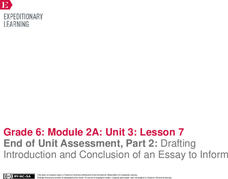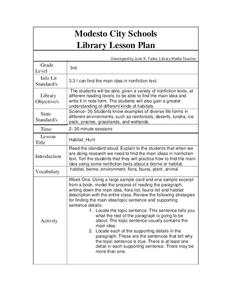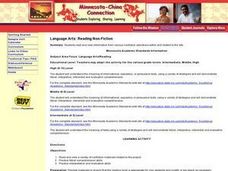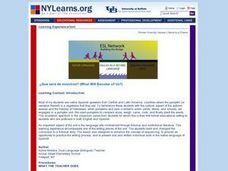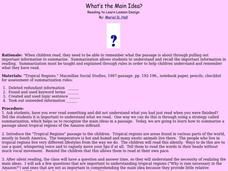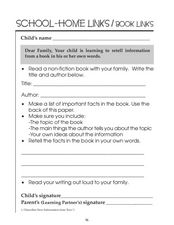Houghton Mifflin Harcourt
Nature: Friend and Foe: Challenge Activities (Theme 6)
The teacher doesn't always have to be the expert in the classroom. The first in a series of three supplementary activities Nature: Friend or Foe uses hands-on research tasks and projects to enhance readers' understanding of non-fiction...
Curated OER
The Mythology of Munich
Students listen to a story read by their teacher and identify the pictures inside it to be real or make believe. For this fiction and non fiction lesson plan, students also write a real or make believe story of their own.
Super Teacher Worksheets
Types of Clouds
What's the term for clouds that look like fluffy cotton balls? What about thick, gray clouds? Learn the names and descriptions for each type of cloud with a worksheet and activity. Learners read four columns of high-level, mid-level,...
Curated OER
Polar Bears
What do you know about polar bears? Get your youngsters writing about these majestic animals with this short writing activity. They simply use the six words provided to create a short story about the picture provided. Review the words...
EngageNY
End of Unit Assessment, Part 2: Drafting Introduction and Conclusion of an Essay to Inform
A powerful introduction and conclusion can really pack a punch. Using the resource, scholars first read and discuss a model essay. Then, as part of the end of unit assessment, they draft the introductory and concluding paragraphs of...
Curated OER
Is this the right book for me?
Sixth graders recognize strategies for selecting nonfiction texts. In this book selection instructional activity, 6th graders practice procedures for knowing if the book is just right for them. Students select from a variety of texts and...
Curated OER
Habitat Hunt
Third graders read several nonfiction texts and practice finding the main idea for the text as well as learn about various habitats. In this main idea lesson, 3rd graders read several nonfiction texts and make habitat cards. Students...
Curated OER
Sum Stuff
Students are introduced to informational text. Students explore nonfiction as a genre. They identify the components and text structure of text nonfiction. Students read a nonfiction passage and write a summary of the passage.
Curated OER
1, 2, 3...A Summary
Students summarize a piece of nonfiction text. After reviewing the correct way to gather the important information needed to summarize, students independently read a nonfiction article. They write a summary paragraph using the process...
Curated OER
Let's be Star Summarizers
Third graders summarize a piece of nonfiction text. After reviewing the correct way to read for important information and summarize that information, students independently read a nonfiction article. They write a summary paragraph using...
Curated OER
Language Arts: Reading Non-Fiction
Students read and view information sent from seven high school students who travel to China. The daily reports that they send back to the weblog section of the site should be of high interest to students in Minnesota.
Curated OER
Specializing in Space
In this literature book review activity, young scholars read a nonfiction book about space or space exploration before choosing a topic to explore further. They choose from 7 activities such as designing a model, writing a letter, write...
Curated OER
Digging Up Dinosaurs
In this dinosaurs worksheet, students read a nonfiction book about dinosaurs and then answer 6 comprehension questions and present an oral presentation.
Curated OER
You Be the Judge
Students explore nonfiction writing by completing a worksheet in class. In this research questions lesson, students read several stories about the Wild West icons Wyatt Earp and Wild Bill Hickok. Students answer study questions about the...
Curated OER
Researching Animals Portrayed in Fables
Students research an animal used in fables. In this lesson on nonfiction texts, students use the Internet to find information about an animal to help them complete a Research Response Sheet.
Curated OER
?Que ser de nosotros? (What Will Become of Us?)
Students discuss uses of a pumpkin. They fill out graphic organizers. Students listen as the teacher reads a story, and participate by repeating sounds the objects make as the story progresses. One student narrates the story while others...
Curated OER
Prereading
Fourth graders participate in think-pair-share reading strategy in this lesson. They identify their purpose for reading as well as purposes for reading fiction/nonfiction. They list and discuss several prereading activities, and then...
Curated OER
What's the Main Idea?
Students summarize a piece of text. After reviewing the correct way to read and summarize, students work in groups to summarize a piece of text assigned by the instructor. They write a summary paragraph using the process outlined during...
Curated OER
Organizing Main Ideas and Supporting Details
Students read given information and identify the main ideas and specific detail of the story. In groups, they read a historical title and create a "book talk" for each one, summarizing the story. In addition, students create a...
Curated OER
Reader's Workshop: Julius
First graders use prior knowledge and reading strategies for the story (Julius). For this reader's workshop lesson, 1st graders use elbow buddies to discuss parts of the story during guided reading. Students review reading strategies.
Curated OER
We Can Eat Smarter
Students practice their reading skills. In this reading comprehension lesson, students read an article titled "We Can Eat Smarter," and then use the reading strategy described to note confusing passages and revisit them.
Curated OER
Ask Questions About a Topic
Learners explore reading comprehension by completing a graphic organizer. For this journalism technique lesson, students discuss important questions they can ask about stories they read to improve comprehension. Learners identify...
Curated OER
School-Home Links/Book Links: Non-Fiction
In this early childhood non-fiction comprehension activity, students read a non-fiction book with caregiver, list the important facts, and retell the book in their own words.
Building Evidence-Based Arguments: Grade 9
High schoolers investigate the dilemma of a proportional response with a lesson about the history of terrorism and militant extremists in the United States. As they examine memos from the FBI and speeches from President Bush and Obama,...
Other popular searches
- Nonfiction Reading Skills
- Nonfiction Reading Passages
- Reading Nonfiction
- Reading Main Idea Nonfiction
- Teaching Nonfiction Reading
- Nonfiction Reading Test
- Nonfiction Reading Group
- Reading Nonfiction Books
- Nonfiction Reading Guide
- Reading Responses Nonfiction
- Nonfiction Reading Lessons
- Narrative Nonfiction Reading






